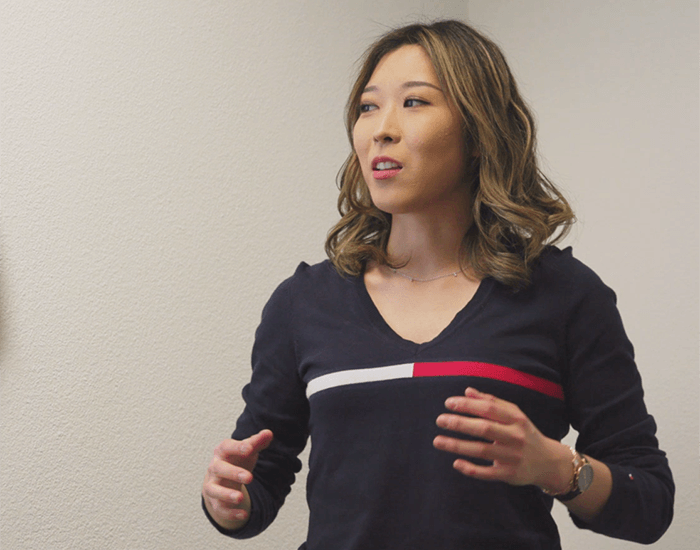Keck Graduate Institute (KGI) student Seunghee (Erin) Kim, PPC '19, MS '20, had a background in computer science, but an internship at City of Hope ignited her passion for biomedical research. At her internship, she got to see firsthand how scientific research could be applied in a hospital setting, specifically to patients with cancer.
"Whatever I'm doing can be contributed to the patients down the road because City of Hope is both a research institute and a hospital," said Kim. "There I got to work with the doctors, who have an MD and PhD. That was a really eye opening experience for me."
At City of Hope, she worked in the Immuno-Oncology department, where she got her first exposure to treating human cancer cells and learning how to culture them. Specifically, she worked with colorectal and breast cancer cell lines with targeted therapy, which attacks specific proteins that would otherwise allow cancer to proliferate.
The work she is doing at City of Hope resonates with Kim on a personal level.
"I have a lot of family members who either had or have passed away from cancer," said Kim.
Even for those individuals who manage to kill the cancer cells through radiation or chemotherapy, they often live in fear that the cancer might come back because it's resistant to so many treatments. Additionally, these treatments also kill healthy cells, which weakens the immune system and leads to many side effects.
By contrast, the type of targeted treatment that City of Hope is working with is much less invasive in that it targets the cancerous cells while leaving healthy cells intact.
Kim's long-term goals are to go into medicine as well as get her PhD so that she can continue to do research while she practices medicine as a physician in the oncology or immunology department.
First, though, she needed to raise her GPA so that she could be a competitive candidate for medical school. She enrolled in KGI's Postbaccalaureate Premedical Certificate (PPC) Program, where she got the opportunity to network and learn about how the medical school applications process works.
"The biggest thing that I got out of my first year was definitely my work ethic," said Kim.
"The classes really taught me a lot about how the scientific principles can be applied to the real world of medicine, and I felt even more passionate about pursuing this field."
Kim appreciates the Master of Science in Applied Life Sciences (MS) program specifically because it helps students to transition into life after graduation.
"Your second year, you're not just studying at school," said Kim. "You're working with the biotech companies or in the lab or at the hospital."
One thing Kim wants students to know, though, is that while maintaining a high GPA or building up their resume may be a top priority, it's still important to take care of themselves and ask for help when necessary. In her case, she credits Dr. Anastasia Levitin and Joon Kim for their support.
"2019 was kind of difficult for me," said Kim. "I went through some personal hardships and pretty bad health setbacks. It was frustrating because I came to KGI with the mindset that I'm going to do all these things on my list and be the best candidate I can be when I apply to medical school."
She found it increasingly difficult to keep up with her workload, though, and both Joon Kim and Levitin reached out to her and offered their encouragement and advice. Levitin even offered to meet up with her once a week just to talk.
"I just want to put it out there that when you're going through stuff, even though it might be discouraging, there are people out there and resources that can get you back on track," said Kim.
Follow Erin in a day in the life at KGI!
https://www.youtube.com/embed?listType=playlist&list=PLzOCY7t8o2R6zaKU0845bi8OnNBVdPM_d
